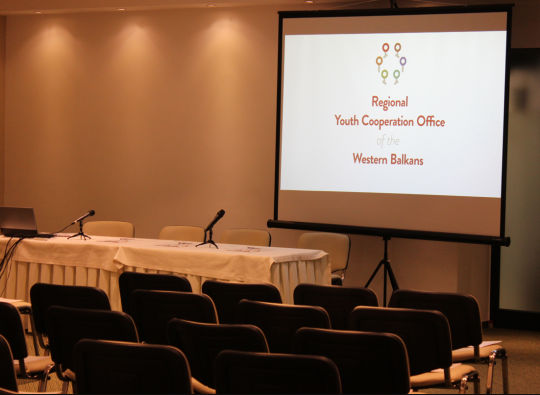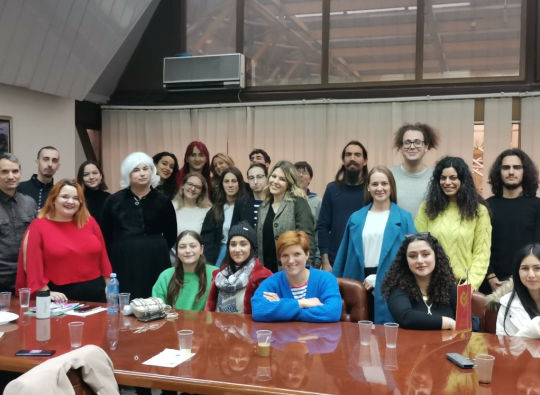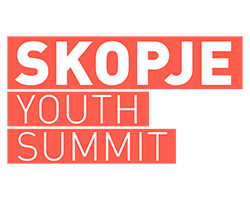Who can still ignore the racial discriminations striking Roma people everywhere in Europe? The list of discrimination, rejection and racist violence that they face, like a baleful litany, is ever-growing and could sink into despair.
In Romania, entire communities are rejected to secluded areas surrounded by walls, lacking water and electricity, like in Slovakia, where Roma women are sterilized. In Bulgaria, they are confined in urban ghettos. In the Czech Republic, they are targeted by an increasing number of neo-Nazi demonstrations. In Croatia, they get Molotov cocktails thrown at them. In Hungary, they are harassed and assaulted by the Jobbik paramilitary militia and therefore have to seek shelter abroad. In Bosnia and Herzegovina, they suffer daily discriminations like in Italy, Moldavia or Serbia. In France, the calls for hatred and even for extermination increase, and Roma people still suffer from stigmatizations and even expulsions similar to the ones that took place under the former government. Some of them are forced to go back to Kosovo, as a consequence of the on-going expulsions from Germany, Denmark or Sweden.
The violence of these discrimination varies according to the countries, but their nature remains the same everywhere. They draw their origins from the same stigmatizing representations and the same over-used stereotypes. Memory is also directly attacked sometimes; this certainly helps make these discrimination linger on. In Lety, for example, in Czech Republic, a piggery has been built on the site of a former Nazi camp, sullying the memory of the 1,300 Roma people who were concentrated there between 1942 and 1943 – only 300 of them survived deportation and their stay in the camp.
In front of this bleak reality, the reaction of the political institutions has not been up to the seriousness of the situation – in some cases it even led to its deterioration. As it could be expected, the “National strategies for Roma inclusion” presented by the EU member-states to the European Commission in late 2011, often planning no budget, no goals and no measures, did not allow any improvement of the situation regarding the social misery and racial domination to which Roma communities are too often confronted. Because it lacks power, legitimacy and sometimes conviction, the Commission has not taken the necessary European measures, while the situation is getting dangerously worse for these communities all around Europe.
It is time for the member-states to stop implementing strategies of avoidance or even rejection, and for the EU to appear as guarantor as far as the observance of the fundamental rights for all individuals is concerned, even though this can lead to a conflict with the member-states. The fundamental values of Europe are at stake here.
Unlike political institutions, the civil society has gotten decisively involved, consequently bringing hope and prospects for the future to a whole continent. For three years now, the Roma Pride has been both the origin and the symbol of this involvement. This vast movement of self-emancipation brings together Roma leaders and organizations and the rest of the European civil society, altogether committed for equality and against the different expressions of racism. The Roma Pride spirit is a spirit of dignity, justice and solidarity that nourishes the numerous initiatives led by the civil society throughout Europe.
On August 2nd, several hundreds of people gathered in dignity on the site of Auschwitz concentration camp to commemorate the Roma genocide, and more particularly the night between August 2nd and 3rd of 1944, when 2,500 Roma people were killed there. This date must be part of the European commemorative calendar: the Samudaripen memory must be given the place it deserves and the current discrimination, rejection and racist violence must be fought by pointing out clearly where they come from.
After the series of racist killings against Roma people in Hungary, the victims and the civil society asked for justice, not revenge. More than three years of proceedings later, the culprits were fairly and heavily punished.The civil society has reacted to the revolting provocations and threats from the neo-Nazis in Czech Republic with solidarity and by calling for the respect of the law.
While the enduring crisis exacerbates nationalist hatred and incites to designate the most fragile ones as responsible for this crisis, when they are actually the first victims of it, we call on all individuals to express their desire to live together in Europe, with our differences in cultures, languages and identities, and to experience their solidarity beyond borders.
On Sunday, October 6th, we will all gather at the same time for the Roma Pride in about 15 European countries, from Paris to Kiev, from Oslo to Istanbul via Prague, Budapest or Bucharest. We are determined to show why and how we can live together in a truly democratic Europe – that is, when we get rid of racism and nationalism at last.
Signed by the anti-racist associations and EGAM (European Grassroots Antiracist Movement) of 31 European countries.
By country :
Albania Aldo Merkoci, President of Mjaft ! Movement and Adriatik Hasantari, President of Roma Active
Austria: Claudia Schäfer, CEO of ZARA, Alexander Pollak, President of SOS Mitmensch and Andrea Härle, Executive Director of Romano Centro
Bosnia and Herzegovina: Alma Masic, Director of Youth Initiative for Human Rights – Bosnia and Herzegovina, Jovan Divjak, President of OBRAZOVANJE GRADI BIH, Defender of besieged Sarajevo
Bulgaria: Deyan Kolev, Chairman of Amalipe Roma Cultural Centre for Interethnic Dialogue and Tolerance, Krassimir Kanev, President of the Bulgarian Helsinki Committee
Croatia: Mario Mazic, Director of Youth Initiative for Human Rights – Croatia, and Jasmina Salihi, Coordinator at Nevo Drom
Czech Republic: Jarmila Balážová, President of Romea, Miroslav Broz, President of Konexe, Táňa Fischerová, President of the Czech Helsinki Committee, Markéta Kovaříková, Director of the Czech Helsinki Committee
Denmark: Jette Moller, President of SOS mod racisme, Ferdi Sabani, President of Roma Forzning i Danmark
Europe: Nicolas Tavitian, Director, AGBU Europe – Armenian General Benevolent Union, Andi Gergely, President UEJS – European Union of Jewish Students, The European Roma and Travellers Forum
Estonia: Merle Haruoja, Member of the Board of the Estonian Centre for Human Rights, Roman Lutt, President of the North Estonia Roma Association
Finland: Janette Grönfors, Coordinator of Rasmus, anti-racist network, and Founding Member of Nevo Roma
France: Cindy Léoni, President of SOS Racisme, and Alain Daumas, President of the Union Française des Associations Tsiganes – UFAT
Germany: Serdar Yazar, Spoke-person of the Turkish Union in Berlin-Brandenburg (TBB) and Emran Elmazi, President of Amarodrom
Greece: Ahmed Moawia, President of Greek Forum of Migrants and Anastasia Georgiou, Research Fellow at the Greek Forum of Migrants
Hungary: Janos Farkas, President of the Government of the Roma Minority of Gyöngyöspata, Jeno Setet, Roma National Leader and Erika Muhi, Director of NEKI
Italy: Angela Scalzo, President of SOS Razzismo, and Graziano Halilovic, President of Roma Onlus
Kosovo: Raba Gjoshi, Director of Youth Initiative for Human Rights – Kosovo, and Muhamet Arifi, Director of Balkan Sunflowers
Latvia: Sigita Zankovska-Odina, Researcher for the Latvian Centre for Human Rights, and Anatolijs Berezovskis, Member of the Board of Nevo Drom
Macedonia: Hristo Ivanovski, President of the Alliance for Human Rights
Moldova: Nicolae Radita, President of the Roma National Center, and Valerian Mamaliga, Manager of the Moldavian Institute for Human Rights
Montenegro: Boris Raonic, President of Civic Alliance, Senad Sejdovi, President Romski savjet and Teuta Nuraj, President of the Nacionalni Savjet Roma i Egipcana
Norway: Rune Steen, Executive Director of Antirasistisk Senter
Poland: Paula Sawicka, President of the Open Republic Association, Katarzyna Kubin, Director of the Foundation for Social Diversity, Klaus Witold, President of the Association for Legal Intervention, Karolina Mirga, President of Harangos andRoman Kwiatkowski, President of Roma People Association in Poland
Portugal: Bruno Gonçalves, Co-President of the Centro de Estudios Ciganos, Manuel Costa, President of Centro de Estudos Ciganos, Henrique Barbosa, President of the Associação Cigana de Coimbra, Dinis Abreu, President of the Associação Cigana de Leiria, Almerindo Barbosa, President of Associação Cigana de Tomar, Olga Mariano, President of Letras Nómadas – Associação de Investigação e Dinamização das Comunidades Ciganas
Romania: Marian Mandache, Executive Director of Romani Criss
Russia: Svetlana Gannushkina, President of the Memorial network for the rights of migrants
Serbia: Maja Micic, Director of the Youth Initiative for Human Rights – Serbia, Jovana Vukovic, Coordinator at the Regional Centre for Minorities and Stevan Nicolic, Manager of Eduactional Center of Roma
Slovakia: Irena Bihariova, President of the Ludia proti rasizmu
Spain: Beatriz Carrillo de los Reyes, President of Fakali
Sweden: Kalle Larsson, President of the Centrum Mot Rasism, Linda Gidlund, Manager of Upsala Anti-discrimination Centre
Turkey: Selcuk Karadeniz, President of Roma Youth Association, and Cengiz Algan, Spoke-person of Durde !
Ukraine: Zola Kundur, President of the funds for Roma women, Chiricli









